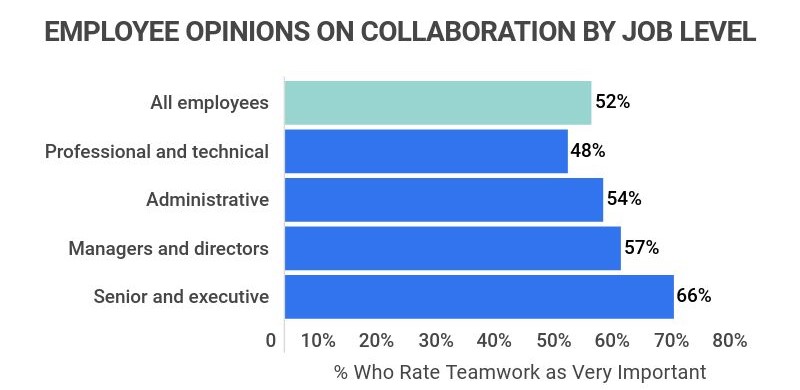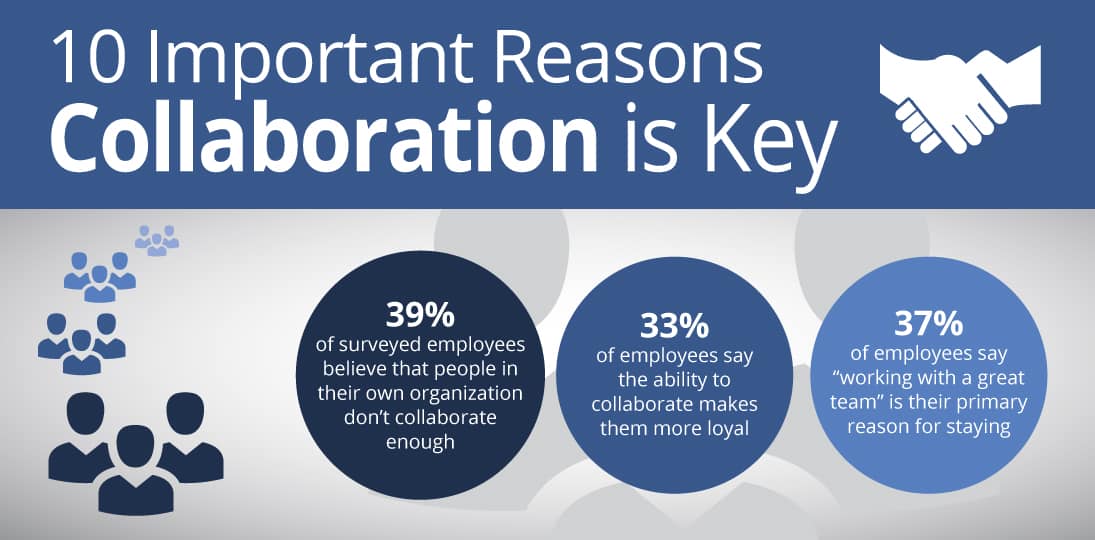Part
01
of one
Part
01
Behavioral Awareness for Teams
Key Takeaways
- On January 26, 2022, Zippia reported the following statistics relating to workplace collaboration, where About 25% of employees do not rate teamwork and collaboration as being very important.
- About 48% of employees in the United States do not rate teamwork as being very important. This rate is 52% among professional and technical employees, 46% among administrative employees, 43% among managers and directors, and 34% among senior and executive employees.
- According to statistics from Bit AI Blog in 2022, "86% of employees and executives cite lack of collaboration or ineffective communication for workplace failures."
Introduction
For this research, we have identified about 20 statistics that speak to how people feel about working on teams at the workplace. Focusing on the negative aspects of working on a team, we triangulated statistics that were present in the positive sense to reflect negative aspects. For statistics needing no triangulation, we referenced and quoted from the sourced websites. From the most current sources, we observed the statistics we reported from outdated sources. As a result, we provided the most relevant statistics being reported in 2022. Further justifications have been provided in the Research Strategy section.
Statistics on How People Feel About Working in Teams
- A little below 50% of workers in the United States say their jobs are not reliant on collaboration.
- About 25% of employees do not rate teamwork and collaboration as being very important.
- In the US, "86% of employees in leadership positions blame lack of collaboration as the top reason for workplace failures."
- 48% of employees in the United States do not rate teamwork as being very important. This rate is 52% among professional and technical employees, 46% among administrative employees, 43% among managers and directors, and 34% among senior and executive employees.
- About 91% of employees feel that workplace collaboration is lacking at their company.
- "39% of employees say people at their organization don’t collaborate enough."
- 25% of people do not value workplace collaboration as being “very important.”
- About 55% of employees do not feel that online collaboration via social networks boosts workplace productivity.
- "60% of employees think that stricter rules would help improve work-life balance, and 42% of employees think that enforcing rules would set a firm expectation on the usage of online collaboration tools."
- "39% of respondents cited poor communication and collaboration are one of the primary causes of workplace stress."
- According to Team Stage in 2022, "41% of team members who are aware of their strengths show lower absenteeism, and 39% of employees report a lack of collaboration."
- "86% of employees and executives cite lack of collaboration or ineffective communication for workplace failures."
- "97% of employees and executives believe lack of alignment within a team impacts the outcome of a task or project."
- "39% of surveyed employees believe that people in their own organization don’t collaborate enough."
- "54% of employees say a strong sense of community (great coworkers, celebrating milestones, a common mission) kept them at a company longer than was in their best interest."
- "33% of millennials want collaborative workspaces."
- "37% of employees say “working with a great team” is their primary reason for staying."
- "33% of employees say the ability to collaborate makes them more loyal."
Research Strategy
For this research on statistics that speak to how people feel about working on teams at the workplace, we leveraged current and the most reputable sources of information available in the public domain, including Zippia, and Bit AI Blog. Focusing on the negative aspects of working on a team, we triangulated statistics that were present in the positive sense to reflect negative aspects. For statistics needing no triangulation, we referenced and quoted from the sourced websites.
From the most current sources, we observed the statistics we reported from outdated sources. As a result, we provided the most related statistics being reported in 2022. For instance, Team Stage and Smarp Blog reported that a study revealed that 41% of employees believed that engagement at the workplace reduces absenteeism. However, our deep-dive search revealed that this is a statistic being reported from a 2017 study conducted by Gallup. Due to this, we maintained some of our findings from 2017 due to their implied relevance in 2022 reports.


